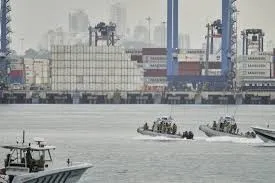Tensions over the strategic Panama Canal flared this week as China accused the United States of “blackmail and plundering” during U.S. Defense Secretary Pete Hegseth’s visit to the Central American nation.
The Chinese Embassy in Panama released a sharp statement rejecting Hegseth’s claims that Beijing is interfering with operations of the crucial waterway. Instead, China turned the blame toward Washington, alleging unfair pressure and exploitation of Panama.
“We urge the United States to stop its blackmail and plundering tactics against Panama,” the embassy stated, adding that China respects Panama’s sovereignty and its authority over the canal.
Rising Global Tensions
The Panama Canal, a vital trade route connecting the Atlantic and Pacific Oceans, has long been a symbol of international power plays. With China’s growing presence in Latin America and the U.S. wary of its expanding influence, the canal has once again become a hotspot in U.S.-China geopolitical rivalry.
Hegseth’s visit was seen as a signal of support for Panama, but it also sparked a diplomatic war of words between the two global giants. The Defense Secretary has warned about China’s increasing investment and control in key infrastructure projects across the region, calling them part of Beijing’s “strategic encroachment.”
As global powers flex their muscles in Central America, Panama finds itself at the center of a high-stakes geopolitical chess game—one that could have lasting effects on global trade and diplomatic alliances.









